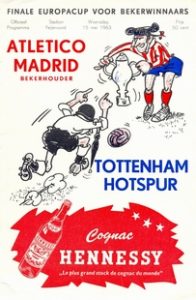European Cup Winners’ Cup Memories
 For those young ‘uns brought up on the misleading title ‘Champions’ League’, it might come as a surprise to learn that the European Cup Winners’ Cup actually was a cup competition between European teams who had won their own domestic cup finals, not just another chance for the top clubs to keep on playing each other and guarantee income streams.
For those young ‘uns brought up on the misleading title ‘Champions’ League’, it might come as a surprise to learn that the European Cup Winners’ Cup actually was a cup competition between European teams who had won their own domestic cup finals, not just another chance for the top clubs to keep on playing each other and guarantee income streams.
All matches except the final were played on a two-legged basis and if you lost, that was it, lads, no safety net like there is nowadays of group stages with the additional safety net of yet another competition (the Europa League) to gently fall into if you do, somehow, manage to get knocked out.
As we shall see in due course with what happened to Leeds in 1973, the global-scale corruption of the Blatter era was unimaginable then. But favourable results could be bought relatively cheaply. The soft target was the referee. Being in the days before euros, you just needed a wad of lira, francs… or drachmas.
Britain enjoyed much more success in the early years of the Cup Winners Cup than in the European Cup itself. The former competition started in 1960/61 and featured English teams or Glasgow Rangers in 9 of the first 13 finals. Although most of those finals were closely-fought affairs, the tournament lacked the glamour of the European Cup and so tended to not live long in the memory for neutral spectators. A few do still stand out, though, mainly for how they connected to England’s World Cup Win in 1966.
 The most memorable of the early finals was Tottenham’s 5-1 thumping in 1963 of Atletico Madrid, winners the previous year. Two of the goals for Spurs were scored by the peerless Jimmy Greaves whose injury in the World Cup group stages probably cost him his place in the Final. No substitutes in those days, so a suited Greaves had to watch England’s historic win from the bench as a supporter. Spurs were the first British winners in Europe, and it was a fitting reward, and swansong, for a team who had done the domestic ‘double’ in 1961 – the first time by any club in 64 years.
The most memorable of the early finals was Tottenham’s 5-1 thumping in 1963 of Atletico Madrid, winners the previous year. Two of the goals for Spurs were scored by the peerless Jimmy Greaves whose injury in the World Cup group stages probably cost him his place in the Final. No substitutes in those days, so a suited Greaves had to watch England’s historic win from the bench as a supporter. Spurs were the first British winners in Europe, and it was a fitting reward, and swansong, for a team who had done the domestic ‘double’ in 1961 – the first time by any club in 64 years.
A curious note about the match highlights you can watch via ESPN Classic. They seem to have been coronavirusised! The commentary has a contemporary voice; too young, the soundtrack too clear to be the original and the crowd noise is fake, lacking the ebbs and flows of a real crowd who are, quite often, almost totally silent as they watch. Crowd noise is an anticipation or a reaction, not the insane, continuous hubbub we are given. There is one, truly ‘classic’ moment when the commentator, even with the supposed benefit of hindsight, describes when a Spurs player on the line paws away a goal bound shot, the ‘keeper Bill Brown beaten, “It’s a decent-looking save but unfortunately it’s handball.”
And an even more curious note is that Wikipedia’s page on Bill Brown has him born in Arbroath and it has him playing one World Cup match for Scotland in 1958 but lists two of his best sellers; The Bureau: My Thirty Years in Hoover’s FBI and Reagan, the Political Chameleon. I didn’t know that!
West Ham’s win in 1965 stands out for involving players who would go on to achieve great fame; Bobby Moore, Geoff Hurst and Martin Peters. With the game being played at Wembley, it meant that Moore had the unique experience, as captain, of lifting three different trophies there in successive years; the FA Cup, the Cup Winners’ Cup and the World Cup. And even if he didn’t lift the Cup again in 1970, at least he was arrested on suspicion of ‘lifting’ a diamond and emerald bracelet in Bogota.
And Bobby liked a drink. Greavsie like a drink. They liked celebrating. They particularly liked celebrating in Blackpool. They had a lot of reasons to celebrate in those days.
 The last match with strong links to the World Cup Final was, understandably enough, the Final in May 1966 where Liverpool lost 2-1 after extra time to Borussia Dortmund, a kind of England v West Germany rehearsal. Kind of. Roger Hunt would go on two months later to turn the tables on the three Dortmund players selected for their nation in the Final; Tilkowski, Emmerich and Held. Hunt is famous for doing absolutely nothing in the World Cup Final except turn away to celebrate Hurst’s ‘was it over the line’ goal.
The last match with strong links to the World Cup Final was, understandably enough, the Final in May 1966 where Liverpool lost 2-1 after extra time to Borussia Dortmund, a kind of England v West Germany rehearsal. Kind of. Roger Hunt would go on two months later to turn the tables on the three Dortmund players selected for their nation in the Final; Tilkowski, Emmerich and Held. Hunt is famous for doing absolutely nothing in the World Cup Final except turn away to celebrate Hurst’s ‘was it over the line’ goal.
That was it for Brits as the Sixties swung to a close, except for Rangers losing their second final of the decade. The early ‘70s proved much more fruitful with Manchester City winning in 1970 (in front of fewer than 8,000 spectators), Chelsea in 1971, then Rangers in 1972 before the hugely controversial 1973 Final between Leeds United and AC Milan…
Graeme Garvey